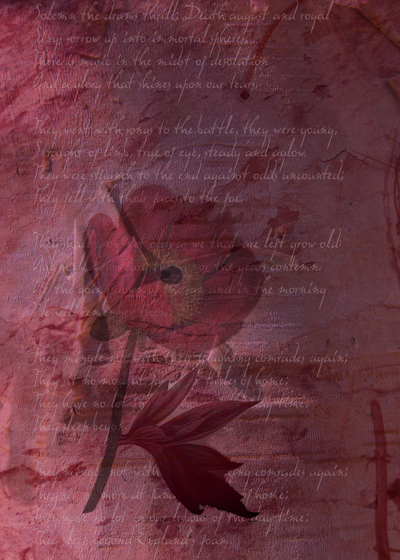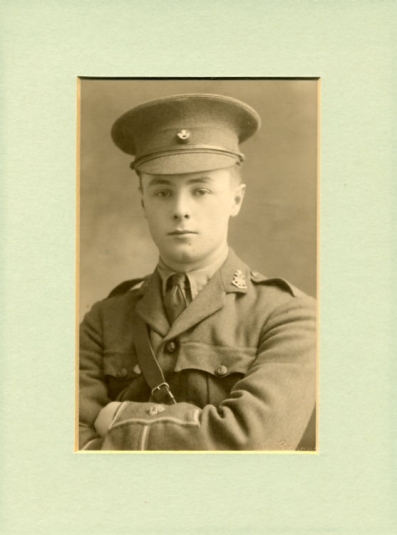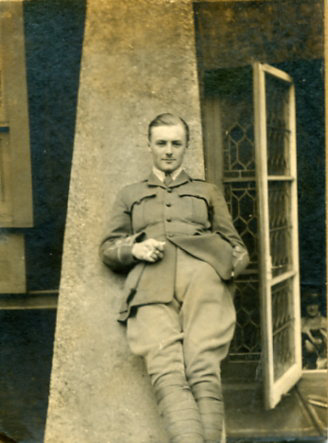
‘Five foot ten of a beautiful young Englishman under French soil. Never a joke, never a look, never a word more to add to my store of memories. The book is shut up forever and as the years pass I shall remember less and less, till he becomes a vague personality; a stereotyped photograph.’

Poor Norman.
Such a commonplace death. Shot by a single sniper. Youngest child, only son. Three sisters and a father left to grieve along with so many other fathers, mothers, sisters, wives, brothers, children.
“Poor Norman,” said my grandmother Joyce in the 1950s, and turned away so that her youngest son changed the subject. Was she still, so many, many years later, too saddened by her brother’s death to talk or had he, for her, become nothing but a stereotyped photograph about whom she felt unable to talk?
A stereotyped photograph. I have two in my possession, both of Norman in Army uniform. The round, boyish face of inexperience looks at me in the one [above]: a bland, almost formal, expression gives way to a makeshift confidence on closer inspection and, with arms folded, suggests a reluctance to be photographed.
In the other [below], he leans against a pillar with engaging insouciance; a cigarette holder, the ash about to drop, rests between sturdy fingers. Three or four years, maybe less, separate the pictures. The poise in the latter cannot mask the face of a man who has experienced the muck and the noise, the unutterable panic and horror of trench warfare.

‘He was hit at four o’clock on the morning of 24th March 1918,’ wrote Joyce the following year. ‘I felt that icy hand on my heart which I shall never now feel again.’ When I first read my grandmother’s words, I took her to mean that only her brother’s death could produce such an icy hand. I look at the words now and see only that she felt her heart would never feel anything again. Perhaps that is why she turned away from her son.
We will remember them.
Captain Norman Austin Taylor 1895-1918
@ALBerridge I thought you might enjoy this post about my great-uncle during #WWI http://t.co/p8CYYU8nRz
— First Night Design (@FirstNightArt) May 15, 2014
@FirstNightArt That’s beautifully written and very moving. No high drama, just the reality of human loss in a war. Great post – thank you.
— Louise Berridge (@ALBerridge) May 15, 2014
@ALBerridge I’m so glad you like it.
— First Night Design (@FirstNightArt) May 15, 2014
Take care and keep laughing!
Related articles
- No More War
- The brothers in arms claimed by the Western Front (telegraph.co.uk)
- Great Profits during the Great War? | Elizabeth Bruton and Graeme Gooday (oddonion.com)
- WWI deaths showed the humanity amid the horror (telegraph.co.uk)
- WWI in Color (metafilter.com)


The three or four years of war had aged this man beyond normal lifetime experiences. He must have seen more in those few years than I in the whole of my own lifetime, though I fortunate never to have seen death in such grim circumstances. As often happened, he grew from boy to man in too short a time.
And, of course as always happened, the women these men left behind also bore the grim circumstances of their deaths. To the extent even of them vowing never to send their men to war again; and which, of course, they did. Sooner, rather than later, women really will take the initiative and become Womankind. Mankind will lapse into a more ‘normal’, less agresive state, leaving (if they have any sense remaining) the important matters of state to their womenfolk. As in the times of the First Nations, or at least some of the more truly civilised ones.
Death, thy grim duty on the killing fields of man, soon be dispensed with, for the sake of all Mother Earth’s Children. Amen.
LikeLike
Yes, Amen to that.
LikeLike
Well written. I so recall the stories of my grandfather. I had a great grandfather who was a medic in the American Revolutionary War. Maybe that’s why I became a nurse?! It’s in the blood. Another great grandfather who took a slug in his spine and was captured by Union troops and held at camp Douglas, Illinois. When the war was over he walked home, barefooted, from Illinois all the way to GA, and was recaptured five times by Union soldiers who did not know the war was over.
LikeLike
Thank you. Your family history sounds utterly fascinating.
LikeLike
Even after three years of war, he still looks so young in the second photograph. But then he was only 23 when he was killed. I can well imagine that grief never left his sister, as they were people who had not expected this slaughter, and had been brought up to believe the propaganda. (on both sides) .Tragic.
In the first photo, he may have his arms folded to display his rank as an officer. It was worn on the cuffs/sleeves early in the war, and you can see it clearly in the photo. The one ‘pip’ visible would indicate he was a first lieutenant at the time, and was probably promoted later on. It is commonplace to see this pose in officers’ photos.
A poignant and touching article.
Best wishes as always, Pete.
LikeLike
Thank you, Pete. Like so many families of our generation, the on-going effect of both wars is unquantifiable. Not only did her brother die but her husband, my grandfather, who also fought in WWI, was killed in 1940 defending Calais. My mother was scarcely 18 and it affected her adversely to the end. This is why I’ve been fascinated with both wars for as long as I can remember and often ponder on the consequences for succeeding generations.
LikeLike
We lost many to the old wars. We must keep their memories alive. Thank you for the story.
LikeLiked by 1 person
Yes, indeed. It is vital we remember and pass the memories down the generations. Thank you for visiting and commenting.
LikeLike
My dear Grandmother lost a nephew in WW2. She talked of him daily till her death. We need to pass to our children the memories of people who fought and die for freedom.
LikeLiked by 1 person
Fought for a freedom that is slowly being eroded because however much we ensure these memories are passed on, generation after generation makes the same mistakes. Your poor grandmother. We are who we are today because of what our immediate forebears endured in the 20th century. My maternal grandfather was killed defending Calas in 1940. He was Joyce’s husband so she lost a brother to one war and a husband to the next. It doesn’t bear thinking about. Except that we must!
LikeLike
You are right.
LikeLiked by 1 person
Reblogged this on Artists4Peace: Artists using intelligence and creativity to foster and spread peace and love throughout the world. We can work TOGETHER to bring about change! .
LikeLike
Such a waste of human life. Such destruction to families while those who take us to war don’t fight. The flower of our youth fought for a cause they believed in while profiteers and armament manufacturers got fat.
There has to be a better way to solve problems than throwing lives at them.
xxx Hugs Galore xxx
LikeLiked by 1 person
‘Twas ever thus and the fall-out affects each new generation and so revenge is fostered and…it goes on. Thank you for commenting, David.
LikeLike